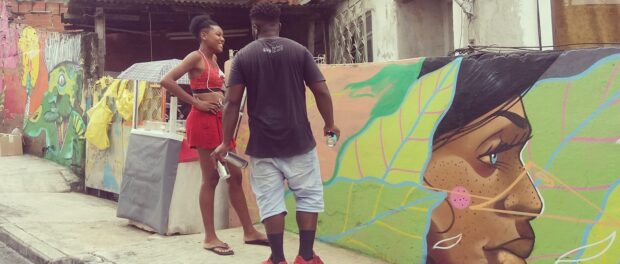
Following last year’s event focused on ‘reinventivity’ in favelas, the 13th edition of the event “Circulating: Dialogue and Communication in Favelas” took place on December 9 in Complexo do Alemão, in Rio’s North Zone, organized by Instituto Raízes em Movimento (Roots in Movement Institute). The central theme this year was mobility, or, in the word organizers chose to better reflect the language of the community: rolébilidade, or “strollability.” The event promotes struggles for rights and social transformation through art, culture, the exchange of knowledge, and contact with others, as actors working in networks across the city come together in Alemão.
“The most important aspect of the event is the occupation of the street space. The event prioritizes the street—everything happens on the street. And in this way it does not only invite the residents to occupy this space, but the whole city. It’s a way to show that the favela is everyone’s space. To show the importance of circulating around the favela, what we are calling rolébilidade. It is to recognize that the favela is the city and the city is the favela. Even though the favela is rarely visited, poorly understood, marked by stereotypes created by the media,” said Edilano Cavalcante, a resident of Manguinhos.
During the event, there was a screening followed by a discussion about the film “Quando Você Chegou Meu Santo Já Estava” (When You Arrived My Saint Was Already Here), produced as the final result of this year’s Faveladoc.com project. The film recounts stories of religions of African origin in Alemão through the affective relationships of the characters with the territory and with religion, and the interconnections with each other and with local memory. Also screened was the film “Trajetos” (Trajectories), produced by Canal Plá from Nova Iguaçu, which tells of stories and affections on the city’s long public transport routes, revealing a positive side of transiting the city, despite its difficulties.
A number of short films about urban mobility made by community communication groups in partnership with Casa Fluminense were also screened. These included “Mototáxi do Azul” (Blue Mototaxi) produced by the multimedia collective Favela em Foco, “Sobre Dormentes, Estamos Acordados” (About Sleepers, We Are Awake) produced by the Facção Feminista Cineclub about women’s experiences on public transport, “Bilhete” (Ticket) produced by Wesley Brasil to investigate the interests involved in the creation of the Single Fare System, and “Conversa Afiada” (Sharp Talk) produced by Institute Raízes em Movimento.
During the debate that followed, with the participation of the films’ directors, Luiz Baltar from Favela em Foco said that support for community media collectives is crucial, as it encourages independent journalism that has a historical role in resistance and which has legitimacy to talk about local issues, as well as being grounded in collectivity. Casa Fluminense led a roundtable discussion on public policy for mobility and urban planning in Rio de Janeiro.
Also included in the program was the First Leopoldina Organic Festival, promoting actions related to waste treatment, food production, and agroecology. Books containing important records about the history of the favela were displayed and available for sale (as an initiative of CEPEDOCA, the Center for Research, Documentation, and Memory of Complexo do Alemão) as were organic foods, as a way to raise awareness about the importance of these products. Throughout the day there were also music, theater, poetry, and graffiti interventions. Having lived 70 of her 87 years in Alemão, Dona Jandira had her image graffitied as a form of homage on the day.



